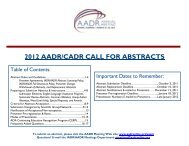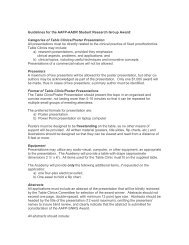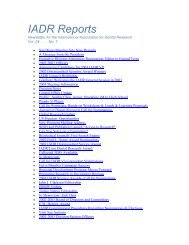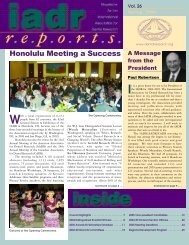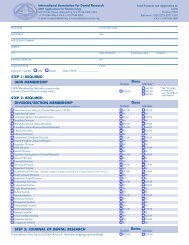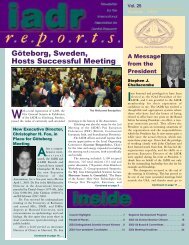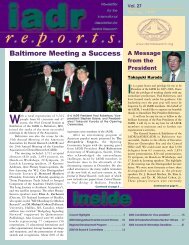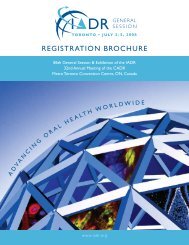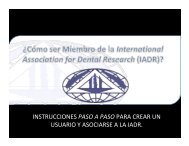- Page 1 and 2:
THE FIRST FIFTY YEAR HISTORY OF THE
- Page 3 and 4:
TABLE OF CONTENTS (CONT.) FOURTEEN
- Page 5 and 6:
ACKNOWLEDGEMENTS If it should prove
- Page 7 and 8:
hardships as they pursued their goa
- Page 9 and 10:
use of chemical methods was not a n
- Page 11 and 12:
has shown, the hundred journals exi
- Page 13 and 14:
Beer in The Emergence of the German
- Page 15 and 16:
development totaled $1.6 billion in
- Page 17 and 18:
propoxyphene. A historic event occu
- Page 19 and 20:
understood, it has responded apprec
- Page 21 and 22:
(400-300 B.C.), the "father of medi
- Page 23 and 24:
discoveries gave to suffering manki
- Page 25 and 26:
population was 1,694,096,000, some
- Page 27 and 28:
Who was this Professor of Biologica
- Page 29 and 30:
December 10, 1920, hereby establish
- Page 31 and 32:
the previous Articles of Agreement
- Page 33 and 34:
SECTION 4. Initiation. Initiation o
- Page 35 and 36:
(C) Election. The Council's nominee
- Page 37 and 38:
CHAPTER FOUR: HAVE OBJECTIVES OF TH
- Page 39 and 40:
indeed they did through many fields
- Page 41 and 42:
international aspect has only recen
- Page 43 and 44:
CHAPTER FIVE: MILESTONES AND LANDMA
- Page 45 and 46:
flourished, although it floundered
- Page 47 and 48:
President. However, the man who was
- Page 49 and 50:
he had also held in the earlier Arc
- Page 51 and 52:
with dental degrees. One individual
- Page 53 and 54:
1978-79 FINN BRUDEVOLD, M.S., D.D.S
- Page 55 and 56:
• University of Illinois College
- Page 57 and 58:
Russell Welford Bunting The Ninth P
- Page 59 and 60:
• Farewell Address delivered at M
- Page 61 and 62:
Charles Francis Bodecker The Ninete
- Page 63 and 64:
Atomic Energy Project, 1947-58 Chie
- Page 65 and 66:
• Editor, American Association of
- Page 67 and 68:
• Harvard School of Dental Medici
- Page 69 and 70:
Professor, Oral Pathology & Diagnos
- Page 71 and 72:
John Barfoot Macdonald The Forty-fi
- Page 73 and 74:
• University of the Pacific, 1972
- Page 75 and 76:
Harald A. Löe The Fifty-sixth Pres
- Page 77 and 78:
• Faculty of Dentistry, Universit
- Page 79 and 80:
• Institute of Dental Research, S
- Page 81 and 82:
Issue of Quality" J Dent Res 73(7):
- Page 83 and 84:
Marjorie K. Jeffcoat The Seventy-se
- Page 85 and 86:
CHAPTER SEVEN: ADMINISTRATIVE ASPEC
- Page 87 and 88:
TRUSTEES AND DIRECTORS IADR Trustee
- Page 89 and 90:
3. J Dent Res 19: 341-342, 1940. 4.
- Page 91 and 92:
service, and which add to the knowl
- Page 93 and 94:
SECTION 2. Duties of the Council. T
- Page 95 and 96:
BYLAWS SECTION A. Membership 1. Nom
- Page 97 and 98:
3. Bonding. The Council shall direc
- Page 99 and 100:
1970 comprised fifty-two Sections,
- Page 101 and 102:
CHAPTER NINE: HONORARY STATUS IN TH
- Page 103 and 104:
On this occasion, Saturday, 24 July
- Page 105 and 106:
CHAPTER TEN: THE AWARDS The concept
- Page 107 and 108:
Titles and papers (almost all were
- Page 109 and 110:
Schour Award Winners 1967 Harry Sic
- Page 111 and 112:
J. A. English 1962-67 F. A. Peyton
- Page 113 and 114:
Periodontal Disease Award N. B. Wil
- Page 115 and 116:
CHAPTER ELEVEN: MEETINGS AND MEMBER
- Page 117 and 118:
25 Chicago Drake Hotel Sat-Sun, 21-
- Page 119 and 120:
(In 1923 no meeting was even planne
- Page 121 and 122:
18 1940 105 ? 540 19 1941 146 ? 555
- Page 123 and 124:
have been active in local Sections
- Page 125 and 126:
JOSEPH F. VOLKER, University of Ala
- Page 127 and 128:
PRESIDENTIAL INAUGURAL ADDRESSES Da
- Page 129 and 130:
RETIRING PRESIDENTIAL ADDRESSES Dat
- Page 131 and 132:
the then current IADR Secretary-Tre
- Page 133 and 134:
Originals of these growth curves we
- Page 135 and 136:
members almost exclusively who were
- Page 137 and 138:
1961 JACD 29: 46-47, 1962 SPECIAL N
- Page 139 and 140:
CHAPTER THIRTEEN: HISTORY OF THE DI
- Page 141 and 142:
of the Australia and New Zealand me
- Page 143 and 144:
Seventeenth 10-11 April 1969, Unive
- Page 145 and 146:
THE JAPANESE DIVISION The Japanese
- Page 147 and 148:
THE NORTH AMERICAN DIVISION MASAO O
- Page 149 and 150:
1. Name: the name of NOF should be
- Page 151 and 152:
Mervyn Shear, 1970-. (The correct t
- Page 153 and 154:
CHAPTER FOURTEEN: HISTORY OF SECTIO
- Page 155 and 156:
Northwest Section by 1952 and in 19
- Page 157 and 158:
THE NEW ZEALAND SECTION The inaugur
- Page 159 and 160:
of tooth substances and filling mat
- Page 161 and 162:
As dental research has grown, so ha
- Page 163 and 164:
Year Summary with all the minutes,
- Page 165 and 166:
Brown, A. J. Bush, H. V. Cottrell,
- Page 167 and 168:
The Iowa Section is an active compo
- Page 169 and 170:
In 1967 there were again thirteen m
- Page 171 and 172:
Martin, Katherene M. Massey, Eugeni
- Page 173 and 174:
December 1922, April 1927, May 1933
- Page 175 and 176:
From time to time, the Pittsburgh S
- Page 177 and 178:
and with Harold C. Hodge and Maynar
- Page 179 and 180:
the Brooke Army Medical Center are
- Page 181 and 182:
applications of isotopes to oral pr
- Page 183 and 184:
affiliated society of the Academy,
- Page 185 and 186:
The Helsinki Section was renamed th
- Page 187 and 188:
President of the IADR in 1940-41, a
- Page 189 and 190:
standpoint of investigations releva
- Page 191 and 192:
"inactivation" of the Prague Sectio
- Page 193 and 194:
After the war and liberation of Aus
- Page 195 and 196:
J Dent Res 12: 709-712, 1932. J Den
- Page 197 and 198:
ecommendation that an International
- Page 199 and 200:
1968 Saul M. Bien Councilor 1966 Ro
- Page 201 and 202:
e beneficial to the dental professi
- Page 203 and 204:
PERSONS ATTENDING THE FIRST MEETING
- Page 205 and 206:
"Dr. Ward was then President-elect
- Page 207 and 208:
Immediately following the organizat
- Page 209 and 210:
THE SOUDER AWARD To give recognitio
- Page 211 and 212:
1963-64 J. F. Glenn (LD Caulk Co) 1
- Page 213 and 214:
President; Stanley P. Hazen, Secret
- Page 215 and 216:
CHAPTER SIXTEEN: HISTORY OF THE JOU
- Page 217 and 218:
windows because of the bright sun s
- Page 219 and 220:
A List of the Names of the Organiza
- Page 221 and 222:
6/1924-26 21 0 7 0 1 0 501 7/1927 2
- Page 223 and 224:
over the next decade. Total receipt
- Page 225 and 226:
15. J Dent Res 3: 229, 1921. 16. J
- Page 227 and 228:
history of the healing arts. Their
- Page 229 and 230:
Mo St Path Soc, St Louis MS, St Lou
- Page 231 and 232:
Toronto. Prac pt perio. FAAPer (hon
- Page 233 and 234:
CLAPP, George Wood. PROSTHETICS. b
- Page 235 and 236:
DEAN, Richard D(oggett). BACTERIOLO
- Page 237 and 238: FÖLDI, Alexis. EFFECTS OF TUBERCUL
- Page 239 and 240: GRIEVES, Clarence J(ones). NUTRITIO
- Page 241 and 242: HOOTON, Ernest Albert. ANTHROPOLOGY
- Page 243 and 244: KIRSCHBAUM, Arthur. ANATOMY. b NYC
- Page 245 and 246: Univ Ireland '40. Chmn Fdn for Dent
- Page 247 and 248: Royal Acad Med Belgium, Kaiserlich
- Page 249 and 250: Education in the United States '41.
- Page 251 and 252: PALMER, Bissel Barbour. DENTAL SOCI
- Page 253 and 254: RUDOLPH, Charles E(ugene). PREVENTI
- Page 255 and 256: SLOMAN, Ernest G. DENTAL ANATOMY. b
- Page 257 and 258: SWEENEY, James T. DENTAL AMALGAMS.
- Page 259 and 260: WACH, Edward C(harles). ENDODONTICS
- Page 261 and 262: WISAN, Jacob M(ordecai). DENTAL HYG
- Page 263 and 264: Columbia University, New York, New
- Page 265 and 266: Recently our division has become qu
- Page 267 and 268: A comprehensive introduction of a c
- Page 269 and 270: Roger Egeberg delivered the keynote
- Page 271 and 272: will require orthodontic treatment.
- Page 273 and 274: esearch and, as I mentioned earlier
- Page 275 and 276: future activities of this Associati
- Page 277 and 278: organizations concerned with dental
- Page 279 and 280: egin to consider taking an active r
- Page 281 and 282: to relieve the disproportion existi
- Page 283 and 284: explosions. In part, both could be
- Page 285 and 286: philosophy. Discrimination rather t
- Page 287: the Use of Audiovisuals in Medical
- Page 291 and 292: for basic research, let me add to t
- Page 293 and 294: 100 percent decline in the death ra
- Page 295 and 296: In the health sciences the answer t
- Page 297 and 298: to give them youthful vigor and mot
- Page 299 and 300: CODA Although the IADR story of the
- Page 301 and 302: Indústria Brasileira de Aparelhos
- Page 303 and 304: 9. Frederick B. Noyes 10. Edward H.
- Page 305 and 306: First Scientific Meeting of the Sou



